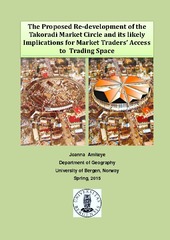| dc.description.abstract | Market centres are important state and private institutions in Ghana. Apart from being the main places for buying and selling, they constitute major sources of livelihood for many people in Ghana, especially women. Despite their importance, many market infrastructures in Ghana are in deplorable conditions and in most cases require urgent renovation and upgrading often referred to as re-development. However, market re-development projects are often fraught with controversies and fierce opposition due to the non-involvement of the traders who are the main beneficiaries and rumours that often reinforce public scepticism of likely displacement of the poor and less powerful traders. After the discovery of oil and gas in the Western Region of Ghana in 2007 and the subsequent oil production and exploration activities, Takoradi city authorities have provided a new development scheme which seeks to renovate and upgrade old buildings within the metropolis. One of the major landmarks to benefit from the re-development scheme is the Takoradi Market Circle (TMC). TMC is the largest market centre in the Western Region and attracts attendants from many parts of the region and beyond. Built many decades ago, the market centre is currently faced with limited space and deteriorating market conditions. The proposed re-development of the TMC therefore envisages upgrading the current two storey market building into a more multi-storey market complex in order to create more trading space for traders. This is in response to the high demand for limited urban space in Takoradi due to increased urbanisation and growth in commercial activities following the discovery of oil offshore the city. However, city authorities lack the financial capacity to implement the proposed plan and seek to achieve this vision through a public private partnership. The study uses a mixed method approach and theories of gender, informality and urban planning to examine the likely implications of the proposed re-development of the TMC for market traders' access to the market space in the envisioned market. It explores the organisation of trading activities in TMC as well as the challenges encountered by traders, especially in their use of the market. It also examines the participation of traders in the planning processes of the future market and how their involvement can inform the plan in terms of dissipating possible conflicts and enhancing traders' input towards the outcome of the project. The study found that organisation of trading activities in done basically along commodity and gender lines. The types of commodities sold and trading spaces occupied by traders are influenced by gender and gender ideologies. Also, gender is fundamental to the various commodity and market associations in TMC. The study also found that the challenges faced by market traders are embedded in gender ideologies and the concept of informality. From a gender perspective women are undervalued, consequently, less attention is paid to the places they work. Also, challenges such as limited access to market space and limited participation in decision making reflects the characterisation of market traders as informal traders. In addition, the study identified that the main objective of the proposed re-development of the TMC and the targeted PPP as the source of funding of the project could have likely implications for the traders as informal workers. | en_US |
